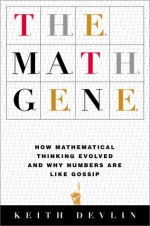The Math Gene
A book review.

The Math Gene
How Mathematical Thinking Evolved & Why Numbers Are Like Gossip
by Keith Devlin
published: 2000.08
ISBN: 0465016189
genre: Science
reviewed:2004.11.03
👍🏼 recommended
This is a book about how the human brain perceives mathematics. That is, how it handles numbers, does math, and understands language. It outlines some possible paths in the evolution of the human mind's ability for abstract thought, and ties mathematical ability to many of our reasoning abilities and our ability to handle language. In fact, the author suggests that abstract reasoning and mathematical ability are side effects of the real purpose of the complex bits of our brains that separate us from other mammals.
He goes as far as to suggest that gossip - which makes up 2/3 of all spoken, written, and broadcast speech - was the real reason that these skills developed. This occurred, he reasons, because gossip allows us to develop and express our interest in one another. The evolutionary advantage in looking out for each other, of course, is enourmous. But the author suggests that we happened upon all of our advanced brain function as a result of developing the ability to talk to one another in complex fashion.
Throughout this dissertation, the author covers a lot of interesting ground as to why we are good at certain things, and why certain things baffle most of us. It also debunks a lot of early research into the field of children's comprehension of math and language, giving - for instance - the first accounts I've read as to why Paget's children seemed so clueless. It also makes the assertion that those people who work in mathematics do so because they are able to relate to the mathematical structures the way that they relate to people, that they see the relationships and properties of mathematical entities the way the rest of us see the figures in fiction (or in our lives).
It's a fascinating read, made challenging by the at times complicated math that it entails. I've actually read substantial parts of it more than once when thinking about certain details of the things it covers, as research for my novel.